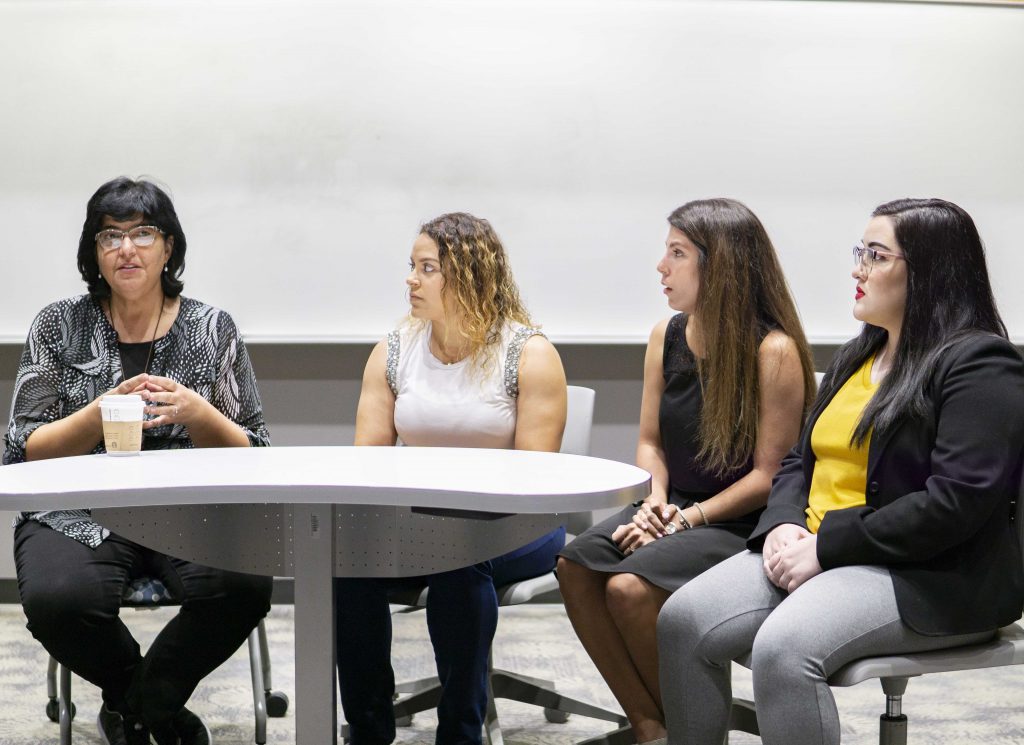The celebration of Hispanic Heritage Month concluded on October 15 with an event focused on African-American and Latin-American heritage, hosted by the Center for Inclusion and Cross Cultural Engagement.
The Center for Inclusion and Cross Cultural Engagement hosted a full calendar of events to celebrate the month, including a Hispanic Heritage film series, Latinx In The Media discussion, Latinas of Ole Miss panel, Fifty Years after 1968: The State of Latin American Politics forum and an “Are You Ready?” dialogue series about the intersection of Latinx and LGBTQ+ identities.
The “What is AfroLatinidad?” panel consisted of five university students, and was moderated by Assistant Professor of Southern Studies and Anthropology Simone Delerme. The panel centered on the complexity of race, identity and heritage for Afro-Latino students.

An audience member discusses life as a Latina woman at the university during Hispanic Heritage Month’s Latinas at Ole Miss panel. Photo by Justin Joyner
The panelists discussed how coming from multicultural backgrounds complicates navigating their African-American and Latin-American heritage. Many panelists said there always seems to be pressure to choose one identity, but the term Afro-Latino embraces both their African-American and Latin-American heritage.
“Whenever I first heard of AfroLatinidad, it kind of signified a community where I could be this whole person and where I can fit in,” panelist and senior international studies major Ashlynn Principe said. “I’m not just black or just Hispanic. I am Afro-Latina.”
Like Principe, panelist and senior broadcast journalism major Annie Mapp said being Afro-Latina allows more freedom in identity.
“To me, AfroLatinidad is having that option and not having to choose between one or the other and being able to be yourself,” Mapp said.
Despite embracing their multicultural backgrounds, the panelists often found that people would try to racially classify them. “What are you?” became a question they often faced.
Panelist Julian Randall, a master’s candidate in the English department, said he often dealt with people who would ask about his race to decide how they would treat him.
“It’s fascinating to see this societal impulse to figure out where in the hierarchy of personhood you fit because not all persons are treated equal,” Randall said. “It’s been interesting to see people actively calculating how they are going to treat me depending on their desire to see me as racially ambiguous.”
Principe said it was other people’s desires to categorize her that made her question her perception of herself.
“I never questioned my own identity until other people started questioning it for me,” Principe said.
Panelist Cisco Santos, a senior computer science major, said being Afro-Latino separated him from his peers in high school, and it led to him being treated differently.
“I was hanging out with friends at the lunch tables, which were all strangely segregated,” Santos said. “There were the white tables, the black tables and the Hispanic tables. One day I was hanging out with my black friends, and one of them called me a ‘mutt.’ I was like ‘What does that mean?’”
Delerme said being Afro-Latino can be difficult for university students.

Panel members discuss the struggles faced by Latina Americans at Ole Miss in September during Hispanic Heritage Month. Photo by Justin Joyner
“People want to put them in a box or make them feel like they are not black enough, not Latino enough or are too white,” Delerme said.
She said the university would benefit from incorporating the Latino experience into classes more, but said she was pleased with this year’s Hispanic Heritage Month and excited to see it celebrated again next year.
Center for Inclusion and Cross Cultural Engagement Graduate Assistant for Mentoring, Retention and Student Engagement Mary Jane Young said she hopes to increase event attendance during next year’s Hispanic Heritage Month.
“I’d love to open it up to more than just people of Hispanic heritage because it’s something we all need to learn about,” Young said. “They are a part of our population and our student body, and it’s really important to learn about it.”
Hispanic Heritage Month is nationally celebrated every year from September 15 to October 15, and a 2016 Pew Research Center Study said 24 percent of “U.S. Hispanics identify as Afro-Latino.”






